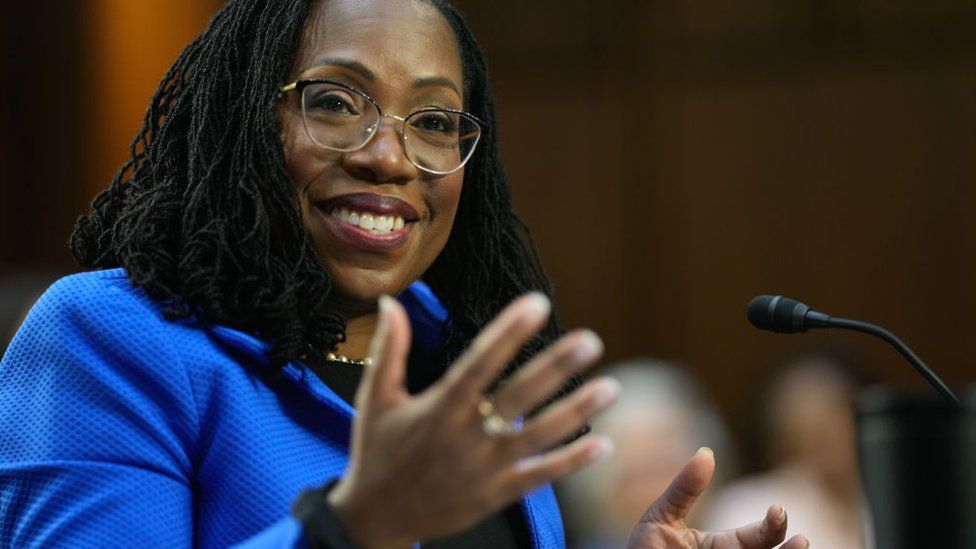(Akiit.com) The confirmation hearings for Judge Ketanji Brown Jackson were different. I was in the room, six or so rows behind her. I work in advocacy, so I’ve sat through a few committee hearings in my time. Some were emotional, some boring, most unmemorable. But this was different. For one, it was a Supreme Court nominee hearing, in itself a once-in-a-lifetime opportunity. But this was a Supreme Court of the United States associate justice nominee hearing for Judge Ketanji Brown Jackson. Yes, I had to spell it out this time because it was so major. This was a moment for Black women like me. It was personal. I see myself in her and I was actually in the room watching it go down.
On the first day of the hearing, you hear the congratulations, the concerns, all the things you would expect. But what stood out to me were the guests in the room. Black women were filing in and out. Young, old, family, friends, strangers, all intensely fixated on what was happening in front of them. It really did feel like you were there to support your sister, your cousin, your auntie. We were so close, we could practically whisper “you got this” in her ear. Little did we know at the time, she needed to hear it. And eventually, she did.

While most of the member supporters congratulated her and asked reasonable and respectful questions, the hearing often grew contentious and disrespectful. Judge Jackson was bombarded with loaded questions about her rulings, personal religious views and issues such as critical race theory, transgender rights and the definition of a “woman,” and thoughts on the Brett Kavanaugh hearings. Some of the senators were so intent on expanding their camera time, they refused to stop with their interrogations when their time expired. Even still, Judge Jackson kept her composure with incredible poise and grace as she carefully answered each question with thoughtful consideration. Most of us would have visibly and verbally grown tired of the repeated questions and constant interruptions. For Black women, that would have been weaponized against us. Judge Jackson is not new to this. She was extremely levelheaded, neutral and prepared to take the heat of the opposition.
But the days of disrespect and chastisement wore on her and wore on the women in the room and those watching on TV.
Then came the words she needed to hear, and we needed to hear for her. Sen. Cory Booker, the lone Black member on the committee, stepped in and stepped up to offer words of love and encouragement. This was the moment the collective was allowed to exhale. Not because Black women can’t hold our own, and certainly not because we can’t push through without it. We’ve been doing that forever. But in that moment, Senator Booker gave Judge Jackson a minute to breathe, regroup and gather. He said the one thing I think all of us were thinking: “It’s hard to look at you and not see my mom … not see my cousin …” That’s precisely why rows of Black women showed up. To have our family’s back.
As a Black woman who has often been socially and professionally the only Black person in the room, I know what it is like to have to bend in the name of compromise and neutrality, to smile and nod respectfully while still trying to get your point across, to stay in your lane. I get it and it’s not always easy.
The first Black woman on the high court was going to have to be exceptional, highly qualified, perfectly prepared. She was going to have to bear the burden of hundreds of years of discrimination and disrespect, of dreams deferred. But she would also be lifted up by generations of Black women who knew we belonged in every room, and on the highest court in the land.
In professor Lisa Fairfax’s introduction, she stated that as a young student on Harvard’s campus, during “those first moments when you wonder if you belong,” Judge Jackson was “the friend that made sure we all did.” Judge Jackson will be an exceptional jurist, and she will ensure justice and fairness for all Americans. But for Black women, she gave us something more, something we’ve always known but the world needed to see: We belong. As we await Jackson’s swearing-in after Justice Stephen Breyer retires sometime this summer, let us heed the advice Judge Jackson has given to the younger generation of Black women: “Persevere.” Because now we know we can truly achieve everything.
Thank you, Judge Jackson.
Columnist; Syrita Simpkins









Leave a Reply